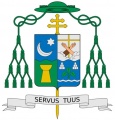Archdiocese of Agaña: Difference between revisions
Knorrepoes (talk | contribs) No edit summary |
Knorrepoes (talk | contribs) |
||
| Line 15: | Line 15: | ||
The principal color of the fields are the Marian colors: blue and white. They recall the chain of islands named alter Queen Mariana of Austria and Guam, the largest island entrusted to the patronage of Santa Marian Kamalen. Blue stands for the deep azure of the Pacific which surrounds the island of the Archdiocese - the Territory of Guam. Whiite recalls the brilliant tropical sunlight which fills the Pacific Islands. | The principal color of the fields are the Marian colors: blue and white. They recall the chain of islands named alter Queen Mariana of Austria and Guam, the largest island entrusted to the patronage of Santa Marian Kamalen. Blue stands for the deep azure of the Pacific which surrounds the island of the Archdiocese - the Territory of Guam. Whiite recalls the brilliant tropical sunlight which fills the Pacific Islands. | ||
The upper half contains the symbol of Mary, the crescent and star, who as Mother of God and of the Church and is represented in Chamarra tradition as Santa Marian Kamalen who is carried in procession each year on the Feast of the Immaculate Conception. The star stands for Mary under the | The upper half contains the symbol of Mary, the crescent and star, who as Mother of God and of the Church and is represented in Chamarra tradition as Santa Marian Kamalen who is carried in procession each year on the Feast of the Immaculate Conception. The star stands for Mary under the title "Star of the Sea". | ||
The lower half shows a "Latte Stone" which represents the link between the ancient Chamarras who first saw the light of Christ at the arrival of the first missionary and Proto-martyr, Blessed Diego Luis de San Vitores, S.J. This symbol represents the continuation and gradual growth and development of Christianity among the Chamarra people under the guidance and charitable leadership ofthe missionaries. | The lower half shows a "Latte Stone" which represents the link between the ancient Chamarras who first saw the light of Christ at the arrival of the first missionary and Proto-martyr, Blessed Diego Luis de San Vitores, S.J. This symbol represents the continuation and gradual growth and development of Christianity among the Chamarra people under the guidance and charitable leadership ofthe missionaries. | ||
| Line 26: | Line 26: | ||
{{media}} | {{media}} | ||
[[Literature]] : | [[Literature]] : Information from the Archdiocese | ||
[[Category:Ecclesiastical heraldry of the United States]] | [[Category:Ecclesiastical heraldry of the United States]] | ||
[[Category:Roman Catholic archdioceses]] | [[Category:Roman Catholic archdioceses]] | ||
Revision as of 09:09, 23 August 2020
Religious or Ecclesiastical heraldry portal
This page is part of the Ecclesiastical heraldry portal |
Heraldry of the World |
|
Catholic heraldry
|
Other Christian churches Other religions
|
ARCHDIOCESE OF AGAÑA
Country : United States
Denomination : Roman Catholic
Established :
Official blazon
Origin/meaning
The principal color of the fields are the Marian colors: blue and white. They recall the chain of islands named alter Queen Mariana of Austria and Guam, the largest island entrusted to the patronage of Santa Marian Kamalen. Blue stands for the deep azure of the Pacific which surrounds the island of the Archdiocese - the Territory of Guam. Whiite recalls the brilliant tropical sunlight which fills the Pacific Islands.
The upper half contains the symbol of Mary, the crescent and star, who as Mother of God and of the Church and is represented in Chamarra tradition as Santa Marian Kamalen who is carried in procession each year on the Feast of the Immaculate Conception. The star stands for Mary under the title "Star of the Sea".
The lower half shows a "Latte Stone" which represents the link between the ancient Chamarras who first saw the light of Christ at the arrival of the first missionary and Proto-martyr, Blessed Diego Luis de San Vitores, S.J. This symbol represents the continuation and gradual growth and development of Christianity among the Chamarra people under the guidance and charitable leadership ofthe missionaries.
Anthony Sablan Apuron (1986-2018)
- No image
Michael Jude Byrnes (2019-present)
Contact and Support
Partners:
Your logo here ?
Contact us
© since 1995, Heraldry of the World, Ralf Hartemink 
Index of the site
Literature : Information from the Archdiocese












